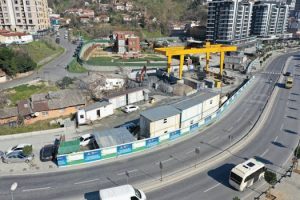Smart Traffic Management: AI-Driven Solutions for Congested Cities
The world’s urban population is on the rise, with more people flocking to cities in search of opportunities and a better quality of life. However, rapid urbanization comes at a cost – congested cities and traffic gridlocks. The increasing number of vehicles on the roads is leading to longer commute times, increased air pollution, and high levels of stress for commuters.
Smart Traffic Management: A Need for Congested Cities
As cities continue to grow, traditional traffic management systems are proving to be inefficient in handling the ever-increasing number of vehicles. This has led to a pressing need for smart traffic management solutions that can streamline traffic flow, reduce congestion, and provide a more efficient and eco-friendly form of transportation.
How AI is Changing the Game
The emergence of Artificial Intelligence (AI) has brought with it a ray of hope for congested cities. With its ability to analyze vast amounts of data and make informed decisions, AI is proving to be a game-changer in revolutionizing traffic management systems. Advanced AI algorithms can learn from real-time traffic data and make predictive models that help in optimizing traffic flow.
Real-Time Traffic Monitoring and Control
The use of sensors and cameras in traffic management systems allows for the real-time monitoring of traffic. These sensors collect data, such as vehicle speed, density, and traffic patterns, and share it with the AI algorithms. The AI can then analyze this data and make swift decisions to optimize traffic flow. For instance, if a particular road is congested, the AI can suggest alternate routes to divert traffic and reduce congestion.
Predictive Traffic Models for Improved Efficiency
AI-driven predictive models can analyze historical data and make efficient predictions about traffic patterns. This allows for better route planning, traffic signal optimization, and adaptive traffic flow management. With these predictive models, the traffic management system can make real-time adjustments to traffic signals based on the current traffic situation, thus reducing waiting times for commuters.
Smart Parking Solutions to Reduce Road Congestion
In congested cities, finding a parking spot is a daunting task that leads to unnecessary traffic on the roads. Smart parking solutions, powered by AI, can analyze real-time data to identify available parking spots, and guide drivers to these spots using mobile apps. This not only makes parking more efficient but also reduces the time spent circling roads in search of parking.
The Role of Autonomous Vehicles in Smart Traffic Management
The development of autonomous vehicles is also playing a critical role in easing congestion in cities. With their ability to communicate with each other and the traffic management system, autonomous vehicles can optimize traffic flow and avoid traffic bottlenecks. These vehicles can also reduce the number of accidents caused by human error, making roads safer for commuters.
The Future is Smart Traffic Management
The potential of AI in traffic management is vast, and with further advancements in technology, it is only going to get better. Smart traffic management systems are not only beneficial for commuters but also for the environment, by reducing carbon emissions and promoting sustainable transportation. With the increasing need for smarter and more efficient transportation in congested cities, the future indeed lies in AI-driven traffic solutions.
In Conclusion
Smart traffic management, with its use of AI and advanced technologies, brings hope for cities struggling with congestion. By optimizing traffic flow, reducing waiting times, and promoting sustainable transportation, smart traffic management solutions are paving the way for the development of efficient, livable cities. It is time for cities to embrace these AI-driven solutions and take a step towards a smarter and more connected future.











